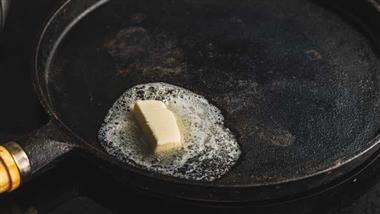
- Modern Western diets have shifted dramatically from traditional saturated fats to polyunsaturated fatty acids (PUFAs) from vegetable oils, triggering metabolic slowdown and increased fat storage
- A higher ratio of saturated to unsaturated fats (like in butter) is metabolically favorable, while oils high in PUFAs are unstable and produce toxic compounds when heated. Even at room temperature or moderate heat (104 to 212 degrees F), PUFA-rich oils can oxidize and form harmful compounds, including during digestion in the body
- Smoke point is not a reliable indicator of cooking oil safety; oxidative stability and PUFA content are the key factors in determining an oil’s suitability for cooking. Tallow and ghee are best for high heat, while butter and coconut oil are ideal for medium heat. Olive oil should be used sparingly due to its high monounsaturated fatty acid content
- When vegetable oils are heated, they produce harmful compounds called Lipid Oxidation Products (LOPs), particularly 4-HNE, which are linked to neurodegenerative diseases, cardiovascular problems, cancer, and chronic inflammation
- Restaurant fried foods are particularly concerning as establishments typically reuse the same vegetable oil hundreds of times before replacement, leading to accumulation of toxic compounds that transfer directly to food
https://articles.mercola.com/sites/articles/archive/2024/12/17/best-fats-for-cooking.aspx
